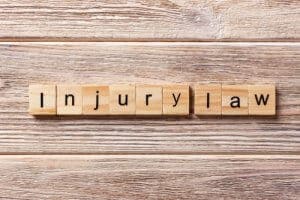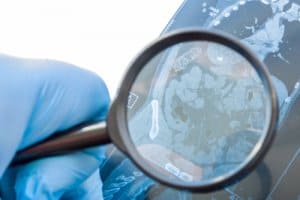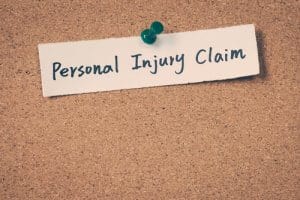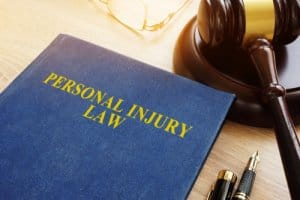The Life of a Personal Injury Claim

As your solicitor we will be with you every step of the way throughout your claim, providing you with advice and support.
We set out below some of the steps in a personal injury claim and what steps we will be carrying out for you as your solicitor.
First Meeting
When you first visit us you will be seen by one of our senior solicitors all of whom have many years of experience in dealing with personal injury, industrial disease and medical negligence claims.
We will discuss the circumstances of your claim with you and explain the steps that are likely to be needed to pursue the claim.
In order to succeed with a claim, it will usually be necessary to prove by way of evidence that your opponent has been negligent this usually means proving that
- Your opponent owed you a duty to take care; and
- Your opponent did not take reasonable care to ensure you were not injured; and
- You suffered injury as a result
Your claim will only succeed if you can prove that it is more likely than not that your opponent’s negligence caused you to suffer injury. The usual test is whether “but for” the negligence, the injury would not have occurred. If without the negligence, you would have suffered the same outcome then there is no “causation” and your claim will fail.
This involves a comparison of the likely outcome without negligence, and the actual outcome after negligence has occurred. The difference between the two outcomes is “the injury”. It is usually necessary to obtain advice from a medical expert to confirm the extent of any injuries caused by your opponent’s negligence.
We will also discuss the various funding options which may be available to you to cover any costs of the claim including dealing with your claim on a No Win No Fee basis.
We will discuss whether you have existing insurance cover and, if not, whether you would wish to take up the option of obtaining legal expenses insurance cover.
If you do wish to take out insurance we will advise you on this and prepare the application for insurance for you.
After the First Meeting
After the first meeting we will usually prepare a statement for you from the information taken at our meeting confirming the circumstances of your injury so that we can refer back to this when necessary during the claim. You will need to sign the statement of truth on your Statement confirming that the information in the statement is true to the best of your knowledge and belief.
We may prepare a Letter of Claim / Claim Notification form at this stage setting out the circumstances of your injury and how it was caused by your opponent’s negligence or breach of duty. This will form the basis of your claim and will be sent to your opponent / their insurer to enable them to investigate the claim.
We will continue to correspond with your opponent / their representatives by letter, e-mail and telephone while they investigate.
Response to Claim
Once we have received your opponent’s reply to the Claim we will discuss their response with you and take your further instructions to check any information or evidence put forward by your opponent. We may also prepare a reply.
Witnesses
As well as preparing statements for you, we will also speak to your witnesses and prepare statements for them confirming their evidence. This can be in relation to the circumstances of the injury or the losses suffered as a result of the injury.
Medical Records

We will usually obtain a full set of your medical records from your GP and any Hospitals or other medical practitioners you have attended. We will usually need to obtain all of a client’s medical records to check that the records are consistent with the circumstances of the injury and to check whether you have had any previous medical problems that may have an impact on the medical evidence in your claim.
We will review your medical records once they have been obtained and discuss any issues arising out of the records with you so that we can advise how best to deal with any such issues
Medical Expert Reports
If liability is admitted, or if liability is denied and we still consider there are reasonable prospects of success, we will usually send a detailed letter to a specialist medical expert to ask them to examine you, review your medical records and prepare a report to provide evidence of the injuries you suffered as a result of your opponent’s negligence.
We will usually cover the initial costs of obtaining the medical report on your behalf. If you are successful with your claim we will recover this from your opponent. If you are unsuccessful we will usually be able to recover the medical report fees from your legal expenses insurer.
The medical expert will usually need to advise on:-
- Details of the injuries suffered in the accident
- The cause of the symptoms
- Any improvement or deterioration of symptoms.
- In the case of injuries / symptoms fully recovered, the date by which there was a full recovery.
- Whether you have ever experienced symptoms in the injured area prior to the accident.
- All ongoing symptoms reported at the medical examination.
- The effects of the injury on your ability to work since the injury was suffered and in the future.
- The impact of the injuries on other activities such as hobbies, recreations, housework, gardening, travelling, holidays, shopping, sex life and your general state of mind.
- Whether any further treatment is necessary;
- Whether further time is needed to make a final prognosis;
- Whether a report is needed from a medical expert of a different discipline; or
- If a follow-up report is needed
If the expert indicates that you require further treatment before they can give their opinion prognosis then we can often obtain an interim payment from your opponent to cover those treatment costs. In many cases we will also arrange for you to undergo such treatment.
Other Expert Reports
In some more complex or serious cases we may need to obtain reports from a number of different types of medical expert as well as other experts to deal with issues of liability and to value the claim.
For Example,
- In a claim for asbestos related illness we may need to obtain a report from a consultant Occupational Hygienist to carry out a calculation of the likely levels of asbestos dust a client has been exposed to over their working life.
- In a claim for Vibration White Finger we may need to obtain a report from a Consulting Engineer to assess the levels of vibration a client was exposed to over their working life.
- In a case involving an amputation injury suffered at work we may need to obtain:-
- A report from a health and safety expert to give evidence of the steps that the employer should have taken to prevent the injury occurring
- Orthopaedic Surgeon report to comment on the injury and what the future holds for the claimant
- Plastic surgeon report to advise on the skin on the wound stump and whether any further treatment is required or is available.
- Prosthetic Expert report regarding the availability and costs of prosthetic limbs. The Claimant may require several different prosthetics for different situations. For example someone who has had a leg amputation may require
- a prosthetic with an articulated ankle for more strenuous activities such as hiking or to allow them to work,
- a silicone covered prosthetic to be worn with shorts.
- a prosthetic to be used when cycling
- a waterproof prosthetic to be used in the shower or when swimming
- Consultant Psychiatrist to advise on the psychiatric impact of the injury, whether
- Care Expert / Occupational Therapist to confirm whether any aids or appliances are available to help the claimant live as close to a normal life as possible and to advise on their cost.
- An architect / accommodation expert to advise on any work needed to alter the claimant’s home to make life easier for them (such as fitting wet rooms, stair-lift, widening doors for wheelchairs etc).
- In a medical negligence claim involving a spinal injury caused during surgery it may be necessary to obtain reports from
- Orthopaedic Surgeon to comment on whether the surgery was carried out negligently
- Neurosurgeon / Neurologist to comment on the nature and extent of the injury caused by the negligent treatment.
- Consultant Psychiatrist to advise on the psychiatric impact of the injury,
- Care Expert / Occupational Therapist to confirm whether any aids or appliances are available to help the claimant live as close to a normal life as possible and to advise on their cost.
- An architect / accommodation expert to advise on any work needed to alter the claimant’s home to make life easier for them (such as fitting wet rooms, stair-lift, widening doors for wheelchairs etc).
Valuation of Claim

Once we have obtained evidence to confirm the extent of your injuries and losses we will advise you as to the likely value of your claim for pain, suffering and loss of amenity (referred to as General Damages) if your claim was to proceed to a trial.
We will also calculate the value of any other losses you have suffered as a result of your opponent’s negligence or that you will suffer in the future. The calculation of those losses will be set out in a schedule of loss which will be sent to your opponent along with any medical and other expert reports you are relying on.
Those losses may include past and future :
- Medication Costs
- Treatment Costs
- Travelling Costs
- Loss of Earnings (including loss of overtime and/or bonuses)
- Personal Care provided by friends, family or others, whether paid or unpaid
- Assistance with household chores
- Assistance with DIY, Decorating, Gardening, Window Cleaning etc
- The cost of new accommodation (in serious injury cases)
We will advise you of what a reasonable settlement would be taking into account the potential value of your claim and any strengths and weaknesses in your claim.
If your opponent makes an offer in relation to any issue in your claim or the value of your claim we will advise you whether we consider the offer is within a reasonable range based on the injuries and losses you have suffered and any risks involved in your claim.
We may advise you to make an offer to your opponent in relation to an issue in your claim or to try to settle the claim.
Court Proceedings

If your opponent denies liability or if we cannot agree a settlement with your opponent you will have the option of starting Court Proceedings to let the Court decide whether your opponent should have to pay compensation and if so the amount of compensation you should receive. Court Proceedings must usually be started within 3 years of the date you suffered injury or the date you first knew or should have been aware you had suffered injury due to something someone had done or had not done (whichever is the later).
Court Documents
We will prepare and discuss with you the paperwork needed to issue court proceedings including the Claim Form and the Particulars of Claim which set out the circumstances of your claim, the injuries you sustained and why we consider your opponent is at fault.
In some cases we will instruct a barrister to advise on the evidence in the claim, the prospects of success and to prepare the Court documentation.
Once Court Proceedings are issued we will have 4 months to send the Court documentation to your opponents.
Defence
Once your opponent has received the Court papers they will usually have 14 days to acknowledge receipt of them and then a further 14 days to send us their Defence.
The Defence is the document setting out your opponent’s position in relation to each part of your claim set out in the Particulars of Claim.
We will go through the Defence with you and explain each aspect of it. In some cases we may recommend that a Reply to the Defence should be prepared to deal with any new issues that have been raised by your opponent in the Defence.
Allocation of Claim
Once the Defence has been served by your opponent the Court will send out questionnaires for both sides to complete with details of the claim. We will complete the questionnaire for you.
The Court will then allocate your claim to a set procedure for dealing with the claim (referred to as a track) depending on the value and complexity of the issues in your claim. Your claim will usually be allocated to either the Fast Track or the Multi-track.
We will prepare a list of suggested directions for the court proceedings and try to agree this with your opponent’s solicitors. This will set out what evidence each side has permission to obtain and will also include a timetable setting out the dates for exchanging relevant documents, witness evidence, expert evidence and for preparing for trial.
In higher value and more complex claims we will also prepare a Budget for the court setting out the likely costs we consider we will need to incur to bring your claim to a conclusion. Your opponent’s solicitor will also prepare a Budget setting out the costs they expect to incur.
We will negotiate with your opponent’s solicitors to try to agree cost budgets. If agreement cannot be reached in relation to either the directions required or the Budgets, we will attend a hearing at Court on your behalf so that Judge can set the directions and budgets in the claim.
Interim Hearings
As the Claim progresses through the Court process we will attend any interim Court hearings on your behalf to decide any issues that cannot be agreed with your opponent’s solicitors. For example we may need to attend a hearing to deal with a request for permission to obtain evidence from a certain type of expert.
Disclosure of Documents
You are under a duty to disclose any relevant documents that have not been prepared for use in your claim and which support your case or that support your opponent’s case.
We will advise you which documents should be disclosed to your opponent. We will prepare a list of those documents held by us and you which are relevant to the claim and which we advise should be disclosed.
We will consider your opponent’s list of documents and request copies of those documents that we do not already have. We will review those documents with you and if necessary amend your statement or obtain other evidence to deal with any issues raised by those documents.
Joint Statements of Experts
If both sides are given permission to obtain their own expert evidence then the Court will usually indicate that each side’s experts must meet and prepare a joint statement setting out the areas where they agree and disagree. We will liaise with your experts and barrister to prepare an agenda for those meetings to ensure that all of the issues in the claim are dealt with by the experts
Preparing the case for trial
In some cases the Court will hold a Pre-trial Review hearing to confirm that all of the evidence required for trial has been obtained. We will attend the Pre-trial Review Hearing on your behalf.
Once all of the evidence in the claim has been obtained and any pre-trial review hearing has taken place we will prepare the bundles of documents to be used by the Judge, Barristers and witnesses at the trial of your claim.
Offers / Settlement

If at any stage of your claim your opponent makes an offer in settlement of the whole or part of your claim, we will advise you of the offer, its terms and whether we consider the offer is reasonable bearing in mind the likely value of your claim and any risks involved in your claim. It will be up to you to decide whether you wish to accept an offer taking into account our advice and the risks involved in your claim.
We will advise you if we consider you should put an offer to your opponent to try to settle any part of your claim and will make the offer on your behalf.
We will carry out negotiations with your opponents to try to reach a settlement of your claim.
In some higher value claims, it might be suggested that a formal settlement meeting or mediation should take place to try to narrow the issues in the claim or reach a settlement. In those circumstances, we will arrange the meeting, or mediation as well as any bundles of documents required. In some cases we will also instruct a barrister to represent you at the meeting / mediation. We will attend the meeting / mediation with you
Trial
If a settlement of your claim cannot be reached and there are still reasonable prospects of you winning your claim then your claim will go ahead to a trial where a Judge will decide whether you should receive compensation and if so the amount of that compensation.
We will arrange for a barrister to represent you at the trial. We will also attend the trial with you.
Assessment of Costs
If you are successful with your claim and your claim is not subject to fixed recoverable costs, we will arrange for a bill of your legal costs to be prepared and sent to your opponents. If we cannot agree the costs that your opponent should pay then we will arrange for the court to carry out an assessment of the bill to confirm what costs your opponent should pay in addition to any compensation you may be awarded.
Thompson & Co Personal Injury Solicitors has been providing specialist advice to members of the public in Personal injury, clinical negligence and related matters for over 20 years.
